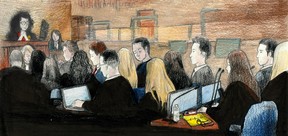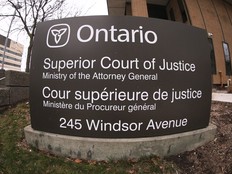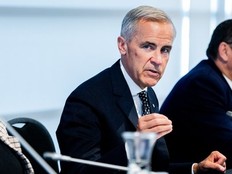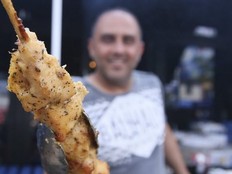MANDEL: Hockey Canada sex assault trial moves to judge alone after jury concerns
But will the move hurt or help the the five accused – all members of Hockey Canada's 2018 winning world junior hockey team

Article content
With a second jury discharged, it’s hard not to think this whole trial is cursed.
The only saving grace is that E.M., the complainant who spent nine gruelling days testifying against her five alleged attackers, will not have to start her testimony all over again. Instead, the five members of Canada’s 2018 winning world junior hockey team will be tried by judge alone.
The question is whether this will hurt or help their chances.
For the second time, Superior Court Justice Maria Carroccia discharged the jury at the request of the defence teams.
This time it was because jurors sent a note that “multiple” members felt lawyers Daniel Brown and Hilary Dudding, who represent former player Alex Formenton, seemed to be whispering and laughing about their appearance as they entered court each day – an accusation they both strongly denied.
The shocking move came near the end of the Crown’s case – and was strongly opposed by prosecutor Meaghan Cunningham.
Formenton, 25, Michael McLeod, 27, Dillon Dubé, 26, Cal Foote, 26, and Carter Hart, 26, have all pleaded not guilty to sexual assault. McLeod has also pleaded not guilty to an additional charge of being a party to the sexual assault.
Megan Savard, representing the five lawyers of the former junior hockey players, said the jury note indicated the defence had suffered “irreparable harm” as criticism of Formenton’s defence team is effectively a criticism of all. She urged the judge to declare a mistrial, discharge the jury and continue by judge alone.
Cunningham called it a drastic, premature solution and argued Carroccia should first question the jurors and see who should be dismissed for bias.
In her decision Friday morning, Carroccia agreed with the defence that the damage was done.
“It is reasonable to conclude that in this situation, negative feelings about counsel and how they conduct themselves might impact the jury’s perception of the accused,” the judge said. “This would obviously compromise the fairness of the trial.”
This is the second motion for a mistrial.
On April 25, Carroccia dismissed the first jury after a juror complained there’d been communication with one of the defence lawyers over the lunch break – once again, it was Dudding who came under suspicion.

The lawyer denied any impropriety, which all the lawyers accepted, but again it was Savard who argued successfully that the jury was now tainted against the defence. Since the trial had just heard the Crown’s opening statement and another jury panel could be quickly convened, the judge agreed to declare a mistrial and start again.
Now hopefully, the third time’s the charm.
It’s been a bumpy road for a case initially closed in 2019 by London Police with no charges and only reopened following public outrage upon learning in 2022 that Hockey Canada had quietly settled a $3.5 million lawsuit. We’ve heard during the trial that the players knew nothing about the civil action that Hockey Canada settled without admitting any ability.
When charges were laid against the five in 2024, abruptly interrupting their hockey careers, it was initially painted as a vulnerable 20-year-old university student gang raped six years earlier by boorish hockey players celebrating their gold medal win at the World Juniors, fuelled by booze and the euphoria of their new championship rings on their fingers.
From the Crown’s opening statement, the black and white of it all suddenly became very grey with admissions that she never said “no” and there were two “consent” videos – though they were recorded after the alleged assaults.

Under unrelenting cross-examination by five different defence teams, E.M. wavered on the stand: She insisted she was crying, her “mind shut down” and she was too intimidated by the men to leave the hotel room during the forced sex acts. But she acknowledged that she took on the “persona” of a porn star because she thought that’s what they wanted and may have invited the men to have sex with her.
Even one of the Crown – not defence – witnesses, Tyler Steenbergen, has testified the naked woman was demanding sex.
“She said, ‘Can one of you guys come over and f— me?'” he recalled.
Would jurors have been more sympathetic to her story – or more inclined to write her off as a party girl who regrets her choices in that hotel room? Unlike the judge, could a jury have been able to determine the nuance of consent, and that it must be present for each sexual act?
And one more important question remains: Should this case have ever been brought to trial in the first place?














Postmedia is committed to maintaining a lively but civil forum for discussion. Please keep comments relevant and respectful. Comments may take up to an hour to appear on the site. You will receive an email if there is a reply to your comment, an update to a thread you follow or if a user you follow comments. Visit our Community Guidelines for more information.